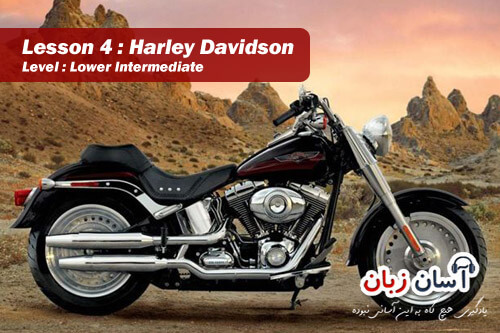آموزش شنیداری زبان انگلیسی | آسان پاد | درس 4 | Harley Davidson

Summary:
Vanessa and Lisa talk about the history of Harley Davidson
In this broadcast Vanessa and Lisa are in the middle of a live show in a radio studio. Listen to their conversation and answer the question that follows about the main idea.
Dialogue:
Vanessa: In tonight’s show Lisa and I will be reporting on the history of Harley
Davidson’s. So Lisa, could you tell our listeners how Harley’s started?
Lisa: Well, many people believe it was a family business but it wasn’t!
Vanessa: What do you mean it wasn’t? Wasn’t it Arthur and Walter Davidson’s idea?
Lisa: No, not really. Do you really wanna know how it got started? …
Vanessa: Yeah, fill us in.
Lisa: It all started in 1901 when Arthur Davidson and his friend William Harley were experimenting on their motor-bicycle. Harley, who was studying to be a mechanic, had drawn up plans for a small engine that would be used in a regular pedal-bicycle frame.
Vanessa: I see. But when did Walter Davidson come into the picture?
Lisa: Walter came in two years later when he helped them finish off building their first bike.
Vanessa: So you’re saying it took them only five years to build their first factory!
Lisa: That’s mostly because they were absolutely mad about bikes, and their aim was to make a bike that would be extraordinary.
Vanessa: And they certainly managed to do so!
Now answer the following question . . . What are Vanessa and Lisa talking about? They’re talking about the history of Harley Davidson Bikes. Now listen again to the dialogue in parts. After each part there will be 3 to 4 questions on the details . . .
.
.
.
.
.
Vanessa: In tonight’s show Lisa and I will be reporting on the history of Harley
Davidson’s. So Lisa, could you tell our listeners how Harley’s started?
Lisa: Well, many people believe it was a family business but it wasn’t!
Vanessa: What do you mean it wasn’t? Wasn’t it Arthur and Walter Davidson’s idea?
Lisa: No, not really. Do you really wanna know how it got started? …
Vanessa: Yeah, fill us in.
Now answer some questions . . . 1. Lisa says: “Do you really wanna know how it got started?” What does “wanna” mean? “Wanna” is the short form of “want to” and is used in informal spoken English. 2. Vanessa says: “fill us in” What does “fill someone in” mean? “Fill someone in” means inform someone.
Now listen to the second part of the dialogue . . .
Lisa: It all started in 1901 when Arthur Davidson and his friend William Harley were experimenting on their motor-bicycle. Harley, who was studying to be a mechanic, had drawn up plans for a small engine that would be used in a regular pedal-bicycle frame.
Vanessa: I see. But when did Walter Davidson come into the picture?
Lisa: Walter came in two years later when he helped them finish off building their first bike.
Vanessa: So you’re saying it took them only five years to build their first factory!
Lisa: That’s mostly because they were absolutely mad about bikes, and their aim was to make a bike that would be extraordinary.
Vanessa: And they certainly managed to do so!
Now answer some questions . . . 1. Vanessa says: “But when did Walter Davidson come into the picture?” What does “come into the picture” mean? “Come into the picture” here means becοme a part of their plan. 2. Vanessa says: “It took them only five years to build their first factory!” What does “take” mean? “Take” here means “last”; so Vanessa is saying that they needed only five years to build their first factory. 3. Lisa says: “…they were absolutely mad about bikes” What does “mad” mean here? “Mad” here means enthusiastic about and is used in informal spoken English.
Draw up (verb): to list, plan or prepare a document.
e.g. The manager drew up a formal agreement when he bought the new company
Engine (noun): a machine that uses energy to produce power or movement.
e.g. Under the hood of a car there is a an engine.
Experiment (verb): to do a scientific test in order to discover what happens in particular conditions.
e.g. Scientists have experimented on animals for many years
Extraordinary (adjective): very special; better or greater than usual.
e.g. Maria Callas was an extraordinary woman.
Family business (noun): a business which is managed by members of a family. e.g. Body Shop used to be a family business. All the members of the family managed it.
Fill someone in (verb): to give more details or information.
e.g. I’ll fill you in on the report as soon as I can.
Pedal (noun): the two parts of a bicycle that you push with your feet in order to make the bicycle move.
e.g. The little girl put her feet on the pedals and began to cycle as fast as she could.

